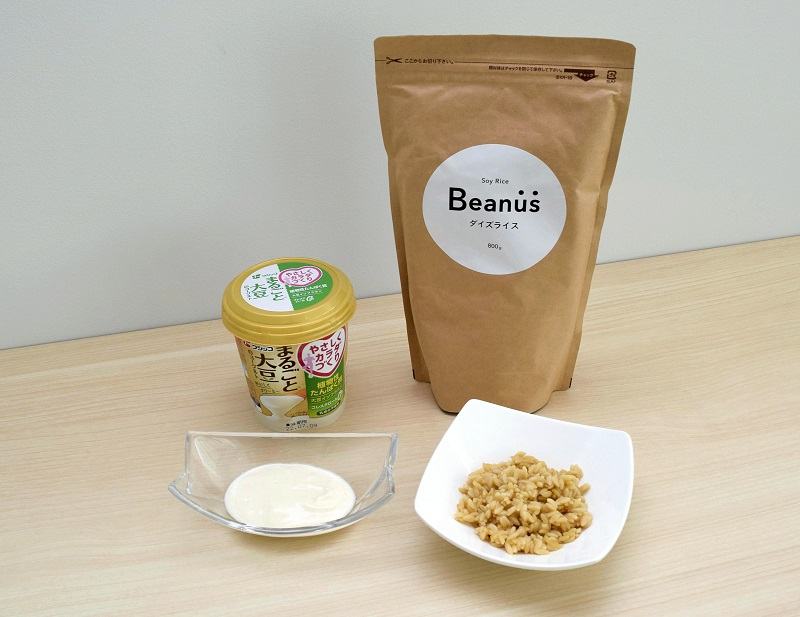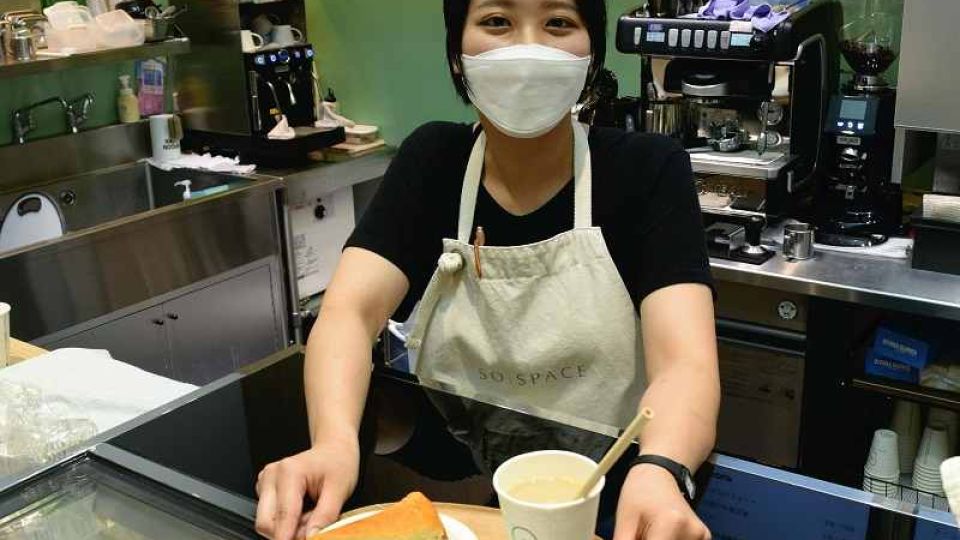August 10, 2022
TOKYO – Soybeans have been a staple menu item for years, but new foods made using the legume have started popping up in stores and eateries.
“Many of the new soybean products are low in sugar and fat, so I can eat them without feeling guilty,” said a 31-year-old company employee from Miyagi Prefecture. “Since a variety of soybean-based foods are now available at my local supermarket, I enjoy trying them.”
Soybean consumption has been on the rise in recent years. According to data compiled by the Agriculture, Forestry and Fisheries Ministry, the daily consumption of soybeans per person was 19 grams in fiscal 2020, up by 2 grams compared to fiscal 2015.

Fujicco Co.’s soybean-based yogurt and rice
In March 2020, Kobe-based major food manufacturer Fujicco Co. launched “Marugoto Daizu no Yoguruto,” a new soybean-based yogurt. The product has low acidity but the sweetness of soybeans.
“Although it’s low in calcium compared to standard yogurts, it’s popular because it’s high in fiber, soy isoflavone and other nutrients found in soybeans,” said Kazumi Shikita, an official of the company.
Fujicco also developed the Beanus Soy Rice series of products as a rice substitute. Some of the flavors available online include gapao rice and fried rice with takana spicy pickled leaves, which are frozen, in addition to regular dried Soy Rice.
In November 2021, Imperfect Omotesando, a cafe and grocery store in Tokyo’s Omotesando district, began selling mayonnaise made using soy milk instead of eggs, as well as two types of dressings made from the mayonnaise.
The cafe began thinking about creating soybean-based products after it started receiving inquiries about plant-based products around 2020. By incorporating spices and other ingredients, it developed its own mayonnaise, which tastes very similar to standard mayonnaise.
Imperfect Omotesando also serves a vegan hot dog, which is made using soy meat, soy milk mayonnaise and soy milk dressing.

Imperfect Omotesando’s vegan hot dog, foreground, and soy-milk based mayonnaise and dressings
The Yomiuri Shimbun
“We have gotten positive feedback about the mayonnaise and it’s a big hit,” said Misako Saeki, Imperfect Omotesando’s marketing manager. “We would like to continue developing more soybean-based products.”
In December, soy milk cafe SOi Space opened in the Minatomirai district of Yokohama in December. Among the shop’s more popular menu items are a cheesecake made with soy milk and okara soy pulp, and soy milk-based drinks made with kokuto brown sugar and black tea. The soy milk is produced at a nearby factory using soybeans grown in Japan.
“Japan’s self-sufficiency rate for soybeans continues to be in the single digits,” said SOi Space manager Yoshiko Kojima. “By introducing [customers] to the superior taste of domestically produced soybeans, we hope to help create an environment where soybean production will increase.”
Hitomi Fujihashi, a nutritionist well-versed in soybeans, said: “Soybeans are low in sugar and high in protein, which is well-suited to today’s health-conscious society. They are also attracting attention as a result of the growing interest in environmentally friendly plant-based foods.”
“Soybeans can be used in a variety of different ways and can be found in a variety of products, both Japanese and Western,” Fujihashi added. “I recommend adding them to your daily diet.”

